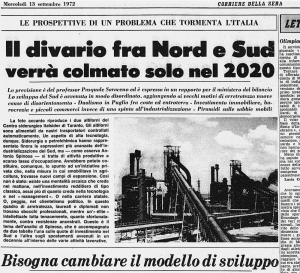Here are links to parts one, two and three of this series.
And here comes the hardest part to write.
What to make of all this? What is in for the unified currency?
It’s clear that in general I don’t fancy the outlook of Euro denominated assets. Will I dump everything and relocate to, like, Sweden or something?
No, not at all.
The unified currency has brought enormous benefits. In just a couple of decades, the amount of societal progress that has been made riding its back is nothing short of incredible. I carry a good deal of emotional attachment to the bruised currency.
I have seen what was there before.
It wasn’t good.
But I want to be brutally clear. I don’t champion the slaughtering of the bad (or should I say “differently performing“) economies in order to save the good parts of the Euro area. But I support the core concept of letting them fail and restructure.
Let’s take Italy again, for example.
Italians are constantly reminded of the effects that endless fuel injections have, across the decades, when they are not invested effectively. When there is always more and more money poured in an attempt to bail out problems that are not really being addressed.
When no specific individuals are ever made personally accountable for any expected return.
It promotes a culture in which the problems are seen as assets, to never be improved upon. They instead become a necessary feature. They are catered for, and economies are born in order to exploit and better capture the bailout efforts. It’s a twisted cycle that repeats indefinitely, unless of course the money pump is turned off for good.

Southern Italy is a prime example of that. We now know, with 50 years of hindsight, that if we just allowed the most underdeveloped part of the country to access a free, unbiased, competitive market, it would have just mended itself over time. But no, five decades of unchecked, aimless money pouring later, we only managed to squander untold amount of value, killing all competitive endeavours in the process, and we are now back at square one.
Man I would really love it if the BCE wanted to avoid repeating mistakes like this.
The Euro is a necessary concept. But it is also a flawed currency. It’s not just some guy on the internet who says this. As a matter of fact, Euro’s lead engineer Jacques Delors is of the same advice, which is something.
The aftermath of the 2008 financial crisis made it pretty clear that a breaking point for the monetary union exists down the line. The response plan, so far, was to play the cards being given, delay its arrival as much as possible and hope for the best. It didn’t work out at all. The current geopolitical environment is only going to get us there faster. Way faster.
Right now the sunken cost fallacy, of having allowed some economies to balloon their debt to unsustainable levels, is keeping the attitude of the ECB in line with its same old habits. Under the political lenses, this is a bubble that must not be allowed to pop. It’s understandable: within the EU, “U” stands for Union after all. But today the timer is ticking at breakneck speed. It is now clear that Europe will soon face a crossroads decision.
Over the years, a number of potential fixes have been proposed. None of those, today, would involve a happy and orderly transition. Which is why the sooner the EU acknowledges this inescapable reality, the better the outcome for all involved parties.
Economies that tend to diverge from each other must be allowed to do so, raking in the good and the bad parts of it. An a-la-carte policy of easy money in which the bad consequences are not felt, is not realistic. Economies must be allowed to develop or fail and recover under natural conditions, not artificially constrained, only to be inflated later. They must only be helped when helping has proven, time and time again, to result in appreciable improvements.
Countries within the EU have differences. They don’t work the same way. Their respective social, political and legal frameworks have different ethical standards. They don’t respond the same way under the same stimulus. Time is needed to work the differences out. It will happen as a slow, natural process.
That is a painful process, and unfortunately it has been almost entirely inhibited for 20+ years. It must be allowed to finally take place.
UPDATE: a “TPI Special” post is out about the ECB attempts to keep it all under control. Check it out. It’s even worse than expected.


